➤
Back to News
26 February 2024
Rural Homelessness Matters
Woodland: maybe it’s a place you go for a walk; maybe it’s the view outside your window; maybe it means nothing to you at all. But for Marek (not his real name, changed for anonymity), it means everything - it is his home.
Living in a tent, trying to keep warm, Marek was hidden away from most of the world. Maybe you’ve passed him on the streets. Maybe you didn’t even see him. Maybe you did, but didn’t realise he was sleeping rough each night outside Wisbech. To many passers-by he was just another nameless man looking for a job. Invisible: no friends, no family. No one to call when he felt lonely or scared; no sofa to stay on when it got dangerously cold outside. No support, even though underneath, he had been grappling with anxiety and depression. Hospitalisations for alcohol abuse were compounded by his inability to speak English. No one could understand what he was going through, or offer him the help he needed. A legal resident in the UK, but holding no form of ID, he couldn’t even access the basic government grants he was entitled to.
Marek was completely alone. There was little hope that things would ever change; ever diminishing reasons to keep going and keep facing every day. Marek is a real person and all of this is true. His situation is currently a reality for many people facing homelessness outside of cities across the UK.
Homelessness in urban areas is of course an issue and it too deserves tackling. But for those living in rural areas, the invisibility of homelessness can be an exacerbating risk that is often underestimated by the government and regional agencies. According to a research report conducted by the universities of Kent and Southampton, rural authorities receive 65% less government funding per capita to tackle homelessness than urban areas do, despite seeing a 115% rise in rural homelessness in 2018-19 alone. The report, commissioned by Homeless Link, also recorded that 91% of respondents witnessed a rise in rural homelessness over the past 5 years. 86% of homeless charities and housing providers in England considered rural homelessness to be a significant problem.
Often referred to as ‘hidden’ homelessness, people in rural areas are generally more difficult to see, meaning many do not have access to key support and are not counted in official censuses and surveys. This results in huge underestimations of true homelessness levels outside of major cities, and makes managing the issue more challenging for charities and programmes that are already underfunded.
Despite major cities like London holding the greatest total number of homeless people, analysis of 2023 government data by the CPRE suggests that the worst affected areas per capita are mainly rural. The number of rough sleepers per 100,000 people were higher in seven rural counties than they were for cities as diverse as London, Norwich and Leeds.
So why is it a problem, and where do the challenges that urban and rural areas face differ?
By comparing Wisbech and the Fenland to nearby Cambridge, the answers become clearer. Like many rural communities, Wisbech (and many other towns in the Fens), is very isolated. Unlike Cambridge, which has two rail stations, multiple bus services and even its own small airport, Wisbech has no train station and a limited bus service. According to data from Census 2021, 60% of Fenland residents said they drove a car/van as their main transport to work, versus just 19% of Cambridge. 23% travelled between 10 and 30 km to reach their employment, and only 20% worked mainly from home. In Cambridge, just 5% travelled that distance and over 45% worked from home. This isolation of rural communities makes finding and commuting to employment more challenging; ownership of a car is required to access many of the jobs in the area.
Job type and qualification levels are also dramatically different, despite the two towns being just 40 miles from one another and located within the same county. Just 7% of Wisbech are employed in professional occupations versus 42% of Cambridge. 55% of Cambridge residents have qualifications classed as level 4 or higher (such as a bachelor's degree), but in Wisbech, this number is just 16%, and 32% of residents have no qualifications at all.
But another number that is also worrying, although generally overlooked, is the number of people in Wisbech who don’t hold passports: 23%, versus 8% in Cambridge. This might make it more difficult for those people to access government benefits, open bank accounts and even vote in elections. Part of Ferry Project’s initial work with clients, particularly those staying in our emergency accommodation, is to make sure the client knows and has access to any benefits they might be entitled to.
This is a symptom of the larger national problem surrounding political policy making - rural communities are being overlooked at the expense of an ever urbanising Britain. The issues within them, just like the people living there, are being ignored. Charities like Ferry Project are working to change that, by providing support that is so often not available.
Marek was found by an outreach team, sleeping in the woods. We offered him a safe place to stay in Ferry Project’s emergency accommodation. Our bilingual support staff were able to talk to him in his native Polish, giving him for the first time a place to explain what he needed and how we could help. We quickly got him settled into modular housing, and helped him explain his mental health issues to a GP so he could get proper support for them. We helped him access an English course. He is enjoying learning, and is looking forward to completing more English courses in the future. A gifted musician, he often plays his guitar for other residents at weekend barbecues.
If you’d asked the man sleeping in the woods whether he thought life would be good again, he wouldn't have said yes. But thanks to his courage, and the support that Ferry Project gave him, he was able to turn his life around. Most importantly, he is no longer invisible. He has a voice. He has a future.
By offering more than just a roof over someone's head, by offering real support, and treating people with the respect and kindness they deserve, Ferry Project is able to not just provide people with housing, but help them build back their confidence and self-esteem too. This all round support is the reason that 80% of clients in the last year have positively moved on from our hostel.
Even if it’s small scale, even if we can only help a few hundred people each year, at least we can do something.
And what can you do? You can talk about these issues; you can raise awareness for rural homelessness, and for small charities like us. Beyond that, you can think about the people you pass on the street. Think about Marek, and how invisible he was. Because we all face our own challenges, and no one deserves to be forgotten.






